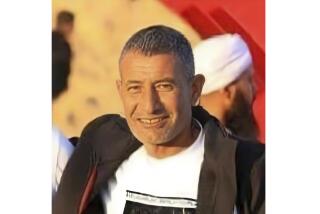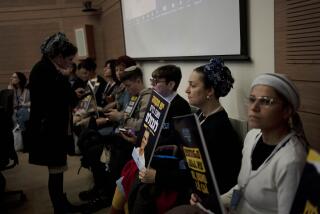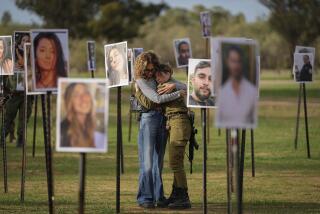India Gives In to Hijackers’ Demands, Ending 8-Day Drama
- Share via
NEW DELHI — The eight-day hijacking drama that took 155 hostages on an odyssey across South Asia and into the desert of Afghanistan ended Friday when the Indian government surrendered to the scaled-down demands of the terrorists by freeing three jailed guerrillas.
The five militant Islamic hijackers, still wearing their masks as they descended from the plane, were given 10 hours to leave Afghanistan, but they had nowhere to go. Afghan leaders refused to grant them asylum, and no other country in the region would publicly agree to take them.
The hijackers met the freed Kashmir guerrillas at a secret location outside the southern Afghan city of Kandahar, where the Indian Airlines jet had sat, and vanished into the rocky wilderness.
In New Delhi, the hostages--some trembling, some weeping, some jabbing their fists into the air--were greeted by a jubilant crowd. Some of the hostages were taken away in ambulances, others in wheelchairs, others by their families. One hostage leaped into a relative’s bearhug. Another paused long enough to denounce the Indian government.
Capt. Devi Sharan, who piloted a terrifying journey with aplomb, rode off on a sea of shoulders, shouting: “I am free! I am free! I am free!”
Flight 814’s only American passenger, Californian Jean Moore, looked exhausted by the experience as she was pushed away from the plane in wheelchair.
“We were scared a lot--we never knew what was going to happen to us,” said Moore, a pale 53-year-old teacher with flowing gray hair. “It was a very interesting study in people.”
Other hostages gave the first glimpses of the horror they endured at the hands of the hijackers. They spent most of the week blindfolded, often cold and afraid they were about to die. One passenger, an Indian man returning from his honeymoon, was stabbed to death in front of his new wife and the rest of the captives.
“In the beginning, they were very violent. If anyone raised their heads they would start kicking them,” passenger Kanika Naithani said as she got into a waiting car outside Indira Gandhi International Airport. “The conditions were inhuman beyond words. The toilets. . . .”
The deal to free the hostages, who were seized Christmas Eve as their plane left Nepal for New Delhi, came together Friday when Indian leaders reversed their policy of refusing to negotiate with terrorists. At one point, the hijackers had demanded the release of 36 militants, $200 million and the corpse of a comrade in India. The militants had been jailed for their role in battling Indian rule in the disputed Himalayan region of Kashmir.
Indian negotiators whittled down the demands, but in the end they decided that they had to give up something if they were going to save the hostages.
“We were able to substantially scale down their demands,” Indian Prime Minister Atal Behari Vajpayee said in a televised speech. “In dealing with the hijackers, the government was guided by two concerns: the safety of the passengers and the crew and the long-term overall interests of our country.”
The United States pledged to work with other governments to ensure that those who seized the aircraft are brought to justice. In Washington, State Department spokesman James B. Foley noted that international law requires those responsible for the hijacking and for the killing of the Indian passenger be prosecuted or extradited to India. It wasn’t known if Afghan authorities were following the hijackers as they made their escape.
The hijacking almost ended in disaster. On Thursday, the talks nearly broke off amid acrimony and disagreement. Afghan soldiers surrounded the plane in a move to intimidate the hijackers, who were carrying guns and grenades. One freed hostage said that, on that day, the hijackers told the captives that they were going to die.
“ ‘We are going to kill you one by one,’ ” Inder Taneja said, recounting the hijackers’ threat.
The Indian government freed three important members of the Kashmiri guerrilla movement: Maulana Masood Azhar, a charismatic leader of the guerrilla group Harkat Ansar, now known as Harkat Moujahedeen; Mushtaq Zargar, commander of the rebel group Umar Moujahedeen; and Ahmad Omar Sayed Sheikh.
Some Indian politicians were opposed to any guerrilla releases, saying such action would undermine efforts to quash the insurgency in Kashmir, where 25,000 people have died since 1989. Indian leaders had been under intense public pressure to help free the hostages, most of whom were Indian.
The end of the hijacking appears to have been facilitated by the Taliban, the militant Islamic group that controls most of Afghanistan. Taliban leaders acted as intermediaries, pushing the Indians and the hijackers to reach an agreement. In addition to sending out troops to warn the hijackers, Taliban leaders agreed to accept the freed Kashmir militants and to allow safe passage for the hijackers.
“We don’t want them in Afghanistan,” the Taliban’s supreme leader, Mullah Mohammed Omar, said in an interview. “They have to leave tonight.”
Indian officials have said that at least some of the hijackers were Pakistani, but that country has refused to grant them asylum, according to sources. The region around Kandahar is desolate and sparsely populated. And the border between Pakistan and Afghanistan, only about 50 miles from Kandahar, is barely policed.
The families of the hostages celebrated the safe return of their relatives. For more than a week, they barely slept as they waited for news. Rita Goyal prayed constantly and didn’t eat while her brother and sister-in-law were held captive.
“Now I will eat all the food I want,” Goyal said. “We will have a great, great party.”
Navneet Sharan, the wife of the pilot, greeted news of her husband’s release with the same equanimity that he showed throughout the crisis.
“I always knew he was going to come back,” Sharan said as she greeted well-wishers at her New Delhi home. “God answered our prayers.”
The passengers at the center of the weeklong ordeal arrived at New Delhi’s airport about 9 p.m. to a joyous and chaotic reception. Upon seeing her relatives at the airport, a female passenger fainted. Several family members sprinted through the airport to greet their loved ones. Amid the shoving and pushing, one little boy held up a sign that said, “Welcome Papa.”
“So many times I thought I would never come back alive,” said passenger Rajiv Ahuja.
Some passengers trained their emotions on the country’s leaders. One said he would rather have died than come home as part of a trade that freed terrorists. Another man, haggard and unshaven, denounced India’s leaders for not getting him released sooner.
“How do I feel? Eight days on a [expletive] plane?” the man barked. “This government has let us down. They are a bunch of jokers.”
Most of the passengers made their way through the gantlet of bright lights and shouting people as best they could. Some could barely move upon spotting their family, standing in the pathway that security guards had cleared for them.
Devinder Singh, disheveled and weeping, collapsed into the arms of his family.
“I love you all very much,” he said over and over. “I was thinking of you all the time.”
*
Rahimullah Yusufzai in Peshawar, Pakistan, contributed to this report.
More to Read
Sign up for Essential California
The most important California stories and recommendations in your inbox every morning.
You may occasionally receive promotional content from the Los Angeles Times.










